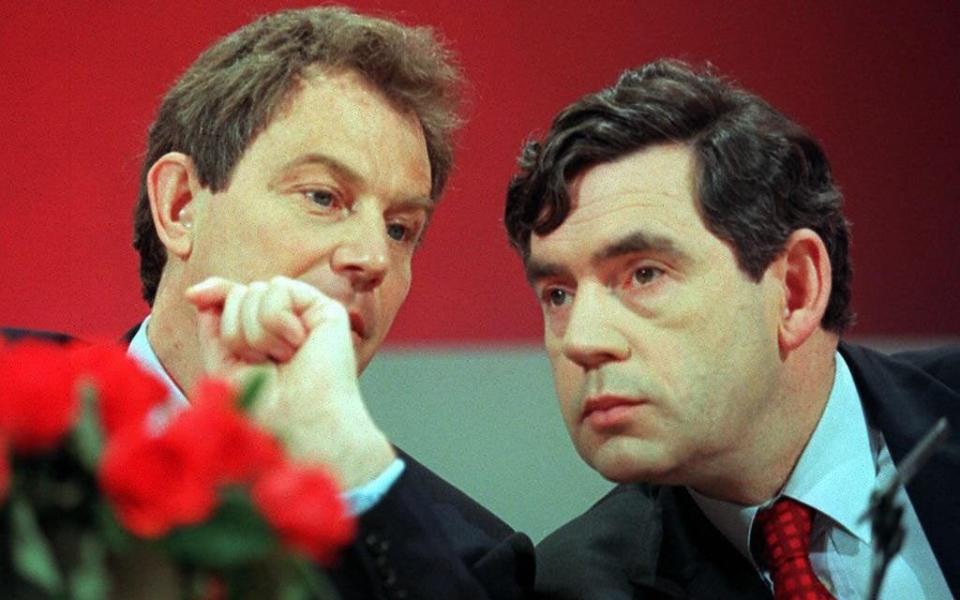Can this Euro-mad, jailbird ex-MP help Labour end its losing streak?

- Oops!Something went wrong.Please try again later.
The Labour Party is not short of advice on how it can get back into contention for government at the next general election. It could do a lot worse than pay close attention to Denis MacShane, Minister for Europe the last time the party was in office, who has neatly encompassed Labour’s dilemma in a short but fascinating history of the past 50 years.
His title, Must Labour Always Lose?, is a deliberate reference to Must Labour Lose? by Mark Abrams and Richard Rose, published in 1960 after three consecutive Conservative general elections victories. MacShane’s musings come at an even more difficult time for his party, after four election defeats – on a scale much greater than was suffered in the 1950s.
MacShane’s chosen time period, which he examines year by year, mirrors his own political career, first in journalism, then in parliament, and lastly outside it. Since it is partly autobiographical it can hardly fail to avoid the elephant in the room: his own incarceration in Belmarsh Prison in 2013 after being found guilty of false accounting in the wake of the MPs’ expenses scandal.
His writing style – more newspaper than novel – is effective, concise and, as his parliamentary colleagues at the time will attest, entirely authentic. “I came out of Brixton prison [where he had spent the latter part of his short sentence] fitter, healthier, weighing less than I had ever managed in eighteen years as an MP. I was earning more money than as an MP. People in London and on the continent laughed at the idea I was a serious criminal.”
This unapologetic, matter-of-fact tone infuses the book with a confidence from which his party could benefit. MacShane is a far more complex and sophisticated observer and practitioner of politics than his critics give him credit for. He was never a straightforward proponent of New Labour and reserves some tough criticism for Tony Blair’s regime.

It was too managerial, at least in its latter years, he writes, and was guilty of a lack of imagination on policy, which swiftly left Labour’s supporters uninspired. He traces the party’s downfall to the 2001 general election, in which Blair won re-election with a landslide similar to the one he had achieved four years earlier, but on a worrying, historically low turnout.
MacShane never stops reminding his readers of his own qualifications to speak on the subject of Europe: he is multilingual and spent many years working for trade unions on the continent before being elected to parliament. His wide network of friends and politicians across Europe lent him a unique perspective on the fortunes of other social democratic and centre Left parties from which Labour could have learned, but chose not to.
It is Britain’s – and Labour’s – relationship with the EEC (and then the EU) that provides the narrative thread of the past half century. His frustration at media criticism of the European project, and his party’s refusal to champion it, is his constant regret, going back all the way to Harold Wilson and Jim Callaghan. Even if you don’t share MacShane’s enthusiasm for the EU (and I do not), it’s difficult to resist the genuine passion and wit of his analysis, not just of the events that led to Brexit, but which inform his entire narrative. And unlike lesser authors, MacShane actually proposes some solutions, instead of simply observing Labour’s mistakes in and out of government.

The book is liberally dotted with suggestions, some of them more persuasive than others. Term limits for MPs, for example, would be unworkable and would provide few, if any, advantages. Similarly, bringing back shadow cabinet elections smacks of process politics that would have no relevance to ordinary voters.
On the other hand, his suggestion that there should be a formal mechanism for deposing a failing party leader can hardly be challenged, given the party’s record in the past 15 years.
Perhaps his most valuable advice is for Labour to behave in opposition as a government – “measured, responsible, representing a broader national interest” – and, when in government, as an opposition – constantly inventing new policies and welcoming argument and debate.
As a (somewhat jaded and eurocentric) account of the past 50 years, Must Labour Always Lose? is lucid, intelligent and readable. Only time will tell if its lessons will be learned by the current party leadership.
Must Labour Always Lose? is published by Claret at £11.99. To order your e-book copy for £4.99 call 0844 871 1514 or visit the Telegraph Bookshop

